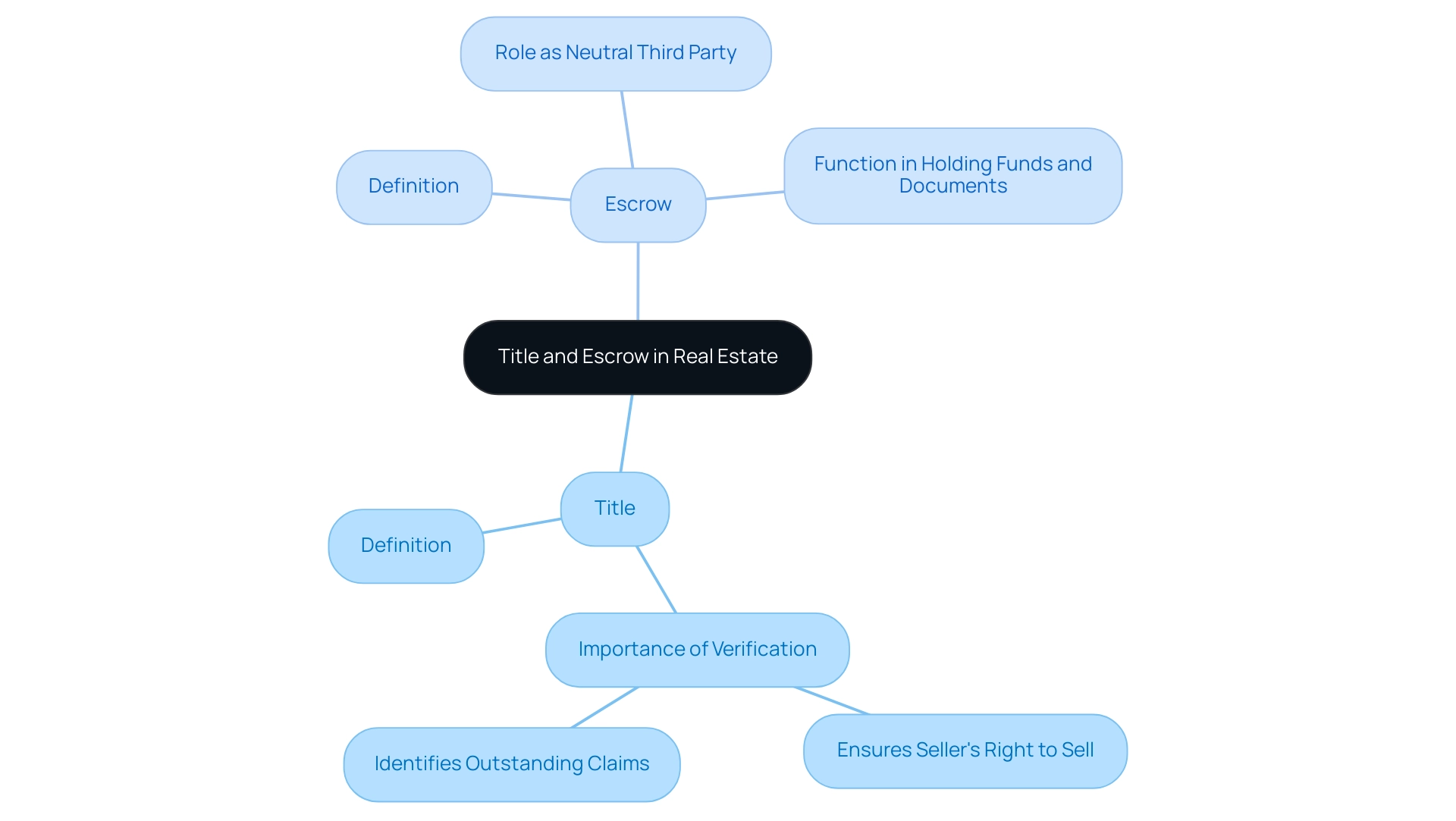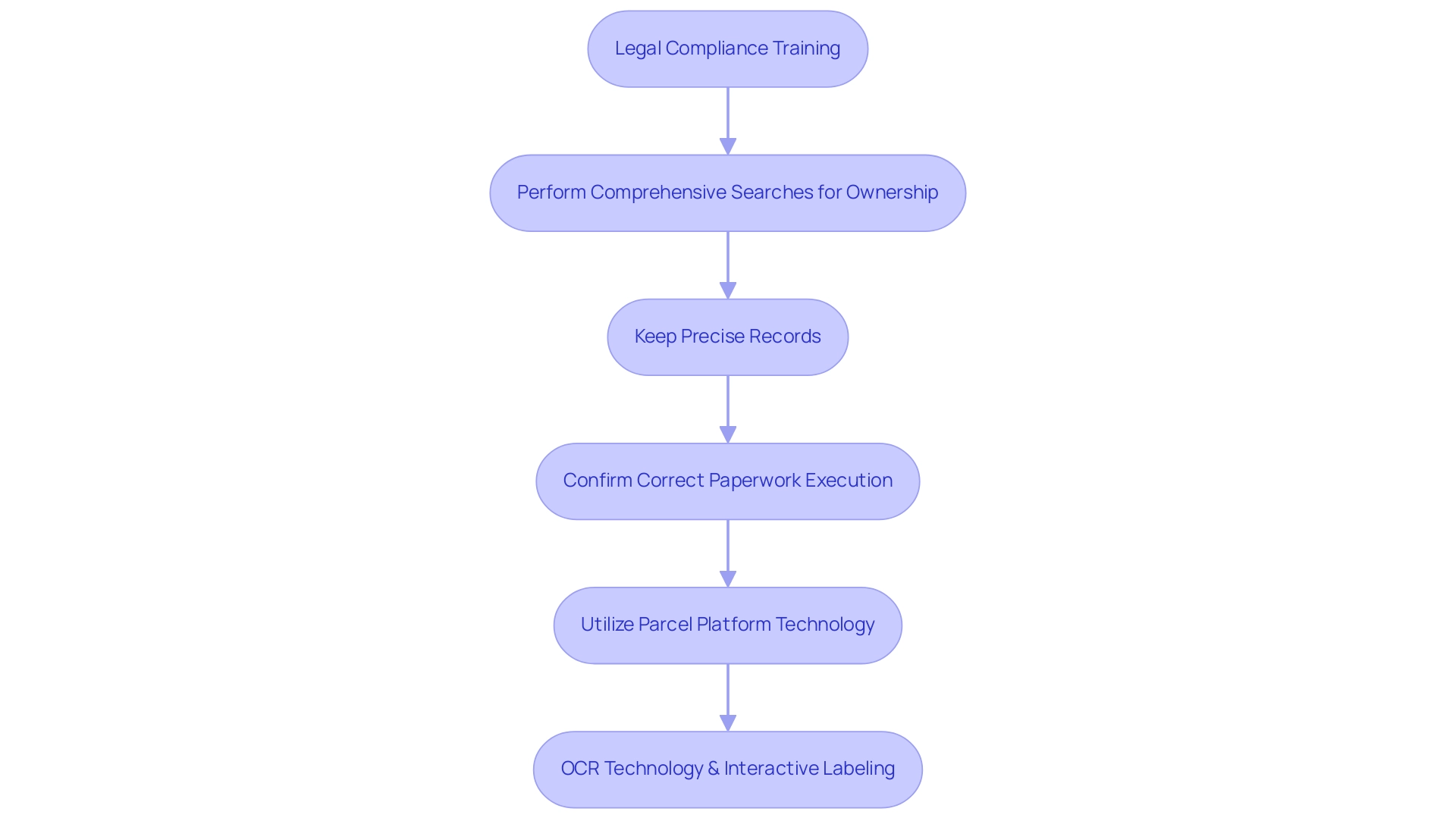Introduction
In the intricate world of real estate transactions, understanding the dynamics of title and escrow is essential for professionals aiming to navigate this complex landscape effectively. Title represents the legal ownership of property, while escrow serves as a neutral intermediary that safeguards the interests of both buyers and sellers until all terms are met. As the real estate industry evolves, so too do the tools and methodologies that support title research and escrow processes.
This article delves into the critical concepts of title and escrow, explores the essential skills and services required for effective training in these areas, and highlights the transformative role of technology in enhancing efficiency and compliance. By equipping professionals with the knowledge and tools necessary to excel, the industry can ensure smoother transactions and uphold the integrity of property ownership.
Understanding Title and Escrow: Key Concepts and Definitions
Title and trust are fundamental components of real estate transactions. Title refers to the legal right of ownership of a property, which must be verified for a transaction to proceed. This verification process ensures that the seller has the right to sell the property and that there are no outstanding claims against it. Escrow, on the other hand, is a neutral third-party service that holds funds and documents on behalf of the buyer and seller until all conditions of the sale are met. Grasping these ideas is vital for individuals engaged in real estate, as they establish the foundation for ownership research and the transaction process, ensuring that dealings are carried out seamlessly and lawfully.

Essential Services and Skills in Title and Escrow Training
Title and escrow training includes a range of vital services and abilities that experts must master to improve the effectiveness and precision of document production and settlement. Key services include title searches, which involve examining public records to verify property ownership and identify any liens or encumbrances.
Utilizing Parse Ai's advanced machine learning tools for processing, professionals can automate these searches, leveraging features like OCR technology and interactive labeling for enhanced accuracy. The example manager allows users to quickly annotate single examples, enabling the extraction of information from a large set of unstructured files, thereby streamlining the processing workflow.
Additionally, training often covers the preparation of closing documents, managing escrow accounts, and ensuring compliance with local and federal regulations. Skills necessary for success in this field include:
- Attention to detail
- Strong analytical abilities
- A deep understanding of legal terminology related to property law
Furthermore, Harbinger Land provides curative services to assist with reviewing ownership opinions and resolving any ownership issues, ensuring a clean chain of ownership and accurate leasing for property and mineral owners. The founders of Parse AI bring over 50 years of combined industry experience, addressing the complexities of and enhancing the credibility of the platform.
Experts who excel in these areas are better prepared to navigate the complexities of real estate transactions, ultimately enhancing the efficiency and accuracy of the research process.
The Role of Technology in Title and Escrow Training
In the contemporary landscape of escrow training, technology is indispensable, particularly through the integration of machine learning and optical character recognition (OCR). According to recent studies, over 70% of companies in the industry have begun implementing to enhance their research efficiency, demonstrating a significant shift towards technology-driven processes. These advanced tools enable researchers to swiftly examine large quantities of records, providing essential information with improved speed and accuracy.
For example, machine learning algorithms excel at identifying patterns within data, enabling professionals to detect discrepancies and potential issues with remarkable efficiency. Furthermore, OCR technology facilitates the digitization of paper documents, streamlining information access and sharing; studies indicate that companies using OCR have reduced document processing time by up to 50%.
Recent advancements, such as the discrete wavelet transform (DWT)-based univariate prognostic model proposed by Ibrahim et al., exemplify practical applications of these technologies for online prediction, relying on past data from univariate time series. Additionally, machine learning applications in property research include automated risk assessment tools that analyze historical data to predict potential defects, further enhancing research accuracy.
By integrating these advanced technologies into training programs, real estate professionals can enhance their skills and significantly improve the overall efficiency of the research process. As Reinaldo Padilha França aptly states,
The distinction between deep learning and machine learning is that the first is one of the techniques used by the second, which consists of training computers to perform activities that humans usually do.
This underscores the transformative potential of these technologies in enhancing research methodologies.
Legal Compliance and Best Practices in Title and Escrow Training
Legal compliance is a cornerstone of effective deed and escrow training. Professionals must be well-versed in local, state, and federal regulations that govern real estate transactions. Recommended methods involve:
- Performing comprehensive searches for ownership
- Keeping precise records
- Confirming that all paperwork is correctly executed
The Parcel platform enhances this process by streamlining processing through advanced OCR technology and interactive labeling, allowing for efficient extraction of vital information from legal texts. A key feature, 'Runsheets in a Flash,' allows individuals in the real estate sector to swiftly create detailed runsheets by automatically assembling extracted data into a structured format.
Training programs should emphasize the importance of compliance, as failure to adhere to legal standards can result in significant financial and reputational consequences. By fostering a culture of compliance and continuous education, title and escrow experts can safeguard their transactions and uphold the integrity of the real estate industry, all while leveraging the powerful capabilities of Persia for enhanced courthouse document processing and streamlined runsheet creation. For instance, using Persia, professionals can reduce the time spent on run sheet creation by up to 50%, allowing them to focus more on critical compliance checks.

Conclusion
Title and escrow are integral to the real estate transaction process, serving as the backbone for legal ownership verification and secure fund management. A comprehensive understanding of these concepts equips professionals with the necessary skills to conduct thorough title searches, manage escrow accounts, and prepare closing documents, all while adhering to legal compliance. The advancements in technology, particularly the integration of machine learning and OCR, have revolutionized the efficiency and accuracy of these processes, allowing professionals to navigate complexities with greater ease.
Training in title and escrow must emphasize both the essential services and the importance of compliance with legal standards. By leveraging innovative tools such as those offered by Parse AI, professionals can enhance their operational capabilities, streamline document processing, and ensure that every transaction upholds the highest standards of integrity. As the industry continues to evolve, embracing these technological advancements will be crucial for maintaining efficiency and accuracy in title research.
Ultimately, the responsibility lies with professionals to stay informed and adapt to these changes, ensuring that they can provide exceptional service in a rapidly changing landscape. By fostering a culture of continuous learning and leveraging the latest tools, the real estate industry can achieve smoother transactions, protect property ownership rights, and uphold its reputation for excellence.
Frequently Asked Questions
What is the importance of title in real estate transactions?
Title refers to the legal right of ownership of a property, which must be verified for a transaction to proceed. This verification ensures that the seller has the right to sell the property and that there are no outstanding claims against it.
What role does escrow play in real estate transactions?
Escrow is a neutral third-party service that holds funds and documents on behalf of the buyer and seller until all conditions of the sale are met, ensuring a secure transaction process.
What are the key services included in title and escrow training?
Key services include title searches to verify property ownership and identify liens or encumbrances, preparation of closing documents, managing escrow accounts, and ensuring compliance with local and federal regulations.
How does technology enhance the efficiency of title and escrow processes?
Technology, particularly through machine learning and optical character recognition (OCR), allows for faster examination of records, improved accuracy in identifying discrepancies, and digitization of documents, reducing processing time significantly.
What skills are necessary for success in title and escrow professions?
Essential skills include attention to detail, strong analytical abilities, and a deep understanding of legal terminology related to property law.
How do companies utilize machine learning in real estate research?
Companies use machine learning algorithms to identify patterns in data, detect discrepancies, and automate risk assessments, enhancing the accuracy and efficiency of property research.
Why is legal compliance crucial in deed and escrow training?
Legal compliance is essential to ensure that all transactions adhere to local, state, and federal regulations. Non-compliance can lead to significant financial and reputational consequences.
What tools can assist in improving compliance and efficiency in title and escrow training?
Tools like the Parcel platform enhance processing through advanced OCR technology and features like 'Runsheets in a Flash,' which streamline the creation of detailed runsheets by automatically assembling extracted data.




